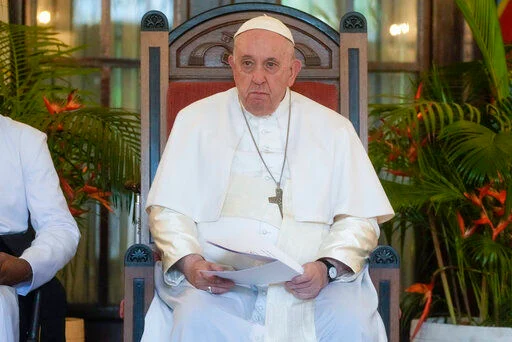Continuing with his cycle of catechesis on the virtues, Pope Francis reflected in the General Audience this Wednesday, April 10, on fortitude, a virtue that “in difficulties, ensures firmness and constancy in the pursuit of good.”
Below is the full text of Pope Francis:
Dear brothers and sisters, good morning!
Today’s catechesis is dedicated to the third of the cardinal virtues, that is, fortitude. Let’s start with the description made by the Catechism of the Catholic Church: “Fortitude is the moral virtue that, in difficulties, ensures firmness and perseverance in the pursuit of good. It reaffirms the decision to resist temptations and overcome obstacles in the moral life. The virtue of fortitude makes one capable of overcoming fear, even of death, and of facing trials and persecutions.” (b. 1808).
Here, therefore, is the most “combative” of the virtues. If the first of the cardinal virtues, prudence, was associated above all with the reason of the human being; and while justice found its home in the will; This third virtue is often associated by scholastic authors with what the ancients called “irascible appetite.”
The thought of the ancients has not imagined a human being without passions: it would be a stone. And the passions themselves are not necessarily the residue of a sin; but they must be educated, the passions are educated, the passions are directed, purified with the water of Baptism, or rather, with the fire of the Holy Spirit. A worthless Christian, who does not bend his own strength to good, who does not bother anyone, is useless. Let’s think about this.
Jesus is not a diaphanous and aseptic God, who does not know human emotions. On the contrary. Faced with the death of his friend Lazarus, he bursts into tears; and in some of his expressions, his passionate spirit shines, as when he says: “I have come to bring fire on the earth, and how I wish it were already burning” ( Luke 12:49), and in the face of commerce in the temple he reacted strongly (cf. Mt 21:12-13). Jesus had passion.
But let us now look for an existential description of this very important virtue that helps us bear fruit in life. The ancients – both Greek philosophers and Christian theologians – recognized in the virtue of fortitude a double development, one passive and the other active.
The first is directed towards the interior of ourselves. There are internal enemies that we have to defeat, which respond to the name of anxiety, anguish, fear, and guilt: all forces that stir in the most intimate part of ourselves and that in some situations paralyze us. How many fighters succumb before even beginning the challenge! Because they do not realize this internal virtue.
Strength is above all a victory against ourselves. Most of the fears that arise within us are unrealistic and do not come true at all. Better then to invoke the Holy Spirit and face everything with patient strength: one problem at a time, according to our possibilities, but not alone! The Lord is with us if we trust in Him and sincerely seek good. So in every situation, we can count on God’s Providence to be our shield and armor.
And then there is the second movement of the virtue of fortitude, this time of a more active nature. In addition to internal trials, there are external enemies, which are the trials of life, and persecution. The difficulties that we did not expect and that surprised us. Indeed, we can try to predict what will happen to us, but to a large extent reality is made up of imponderable events, and in this sea sometimes our boat is shaken by the waves. Fortitude then makes us resilient sailors, who do not get scared or discouraged.
Fortitude is a fundamental virtue because it takes seriously the challenge of evil in the world. Some pretend that it does not exist, that everything is fine, that the human will is sometimes not blind, and that the dark forces that bring death do not fight in history. But it is enough to look at a history book, or unfortunately, even the newspapers, to discover the “nephandasses” of which we are partly victims and partly protagonists: wars, violence, slavery, oppression of the poor, wounds that have never healed and that still bleed. The virtue of fortitude makes us react and shout a resounding “no” to all of this. In our comfortable West, which has “watered down” everything a little, which has turned the path of perfection into a simple organic development, which does not need to fight because everything seems the same, we sometimes feel a healthy nostalgia for the prophets. But uncomfortable and visionary people are very rare.
We need someone to lift us up from the “soft place” in which we have lain and make us repeat decisively our “no” to evil and everything that leads to indifference. No to evil and no to indifference, yes to the path that makes us progress in life. This is worth fighting for.
Let us rediscover, then, the strength of Jesus in the Gospel, and let us learn it from the testimony of the saints.



